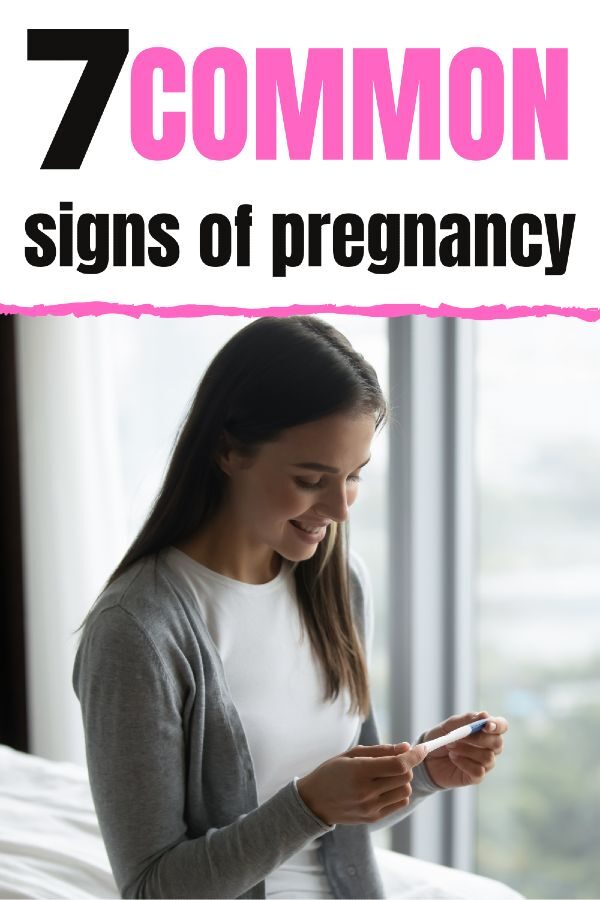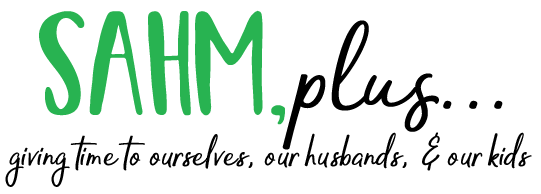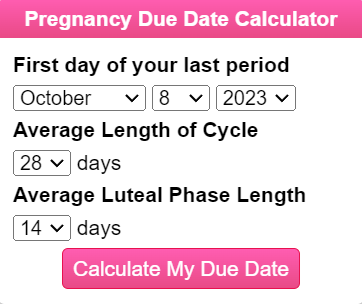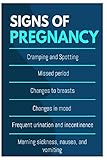Am I pregnant? This is a common question, especially among first-time moms. In this post, we’ll discuss the 7 signs that you are pregnant.
I remember the first time I got pregnant like it was yesterday!
My husband and I had been trying to conceive for about 6 months after stopping birth control. I had been anxious and excited to finally be able to run into the room with a pregnancy test in hand to say “I’m pregnant!”
To my surprise, when I finally did become pregnant, I missed all the signs.
It wasn’t until someone told me I was pregnant that I began thinking about some of the odd things going on with my body. Even then, I didn’t feel pregnant.
But my 2nd experience was completely different! In fact, I’m pretty sure I felt the moment of implantation, but that’s a whole other story.
The purpose of this post isn’t about me though. I want to help you understand the signs that you may be pregnant. Plus, things to think about before jumping to the conclusion that you’re pregnant because these signs can be symptoms of other things going on.

How Early Do Pregnancy Symptoms Start?
Most women won’t experience pregnancy symptoms for several weeks. However, some women can experience early signs of pregnancy in about a week.
Some early pregnancy symptoms may include:
- implantation bleeding around 6 to 12 days after conception
- cramping
- nausea can occur as early as 2 weeks after conception
- breast swelling or tenderness may be noticed as early as 1-week post-conception
If you believe you’re pregnant but aren’t experiencing pregnancy symptoms, it could be too early and that’s okay!
What Does Early Pregnancy Feel Like?
Depending on how early or how sensitive your body is to the changes you’ll experience during pregnancy, early pregnancy may not feel different.
Many women don’t realize they’re pregnant at all very early in their pregnancies!
Sometimes you don’t see the signs or feels the symptoms of pregnancy until 6 weeks or later.
In the next section, we’ll discuss some of the most common signs of pregnancy.
7 Signs That You Are Pregnant
Keep in mind that these are the most common signs that you are pregnant. There are other, less common signs and it can depend on your body and how it reacts to the changing hormones.
And, just because you experience any of these signs, it doesn’t automatically indicate that you are pregnant. Read on to find out more.
Missed Period
Ah, the classic sign that often sends us into a frenzy of pregnancy speculation – the missed period. While it’s true that this can be a strong indicator, let me tell you, it’s not always as clear-cut as it seems.
You see, before my first pregnancy, my periods were all over the place. They’d come and go as they pleased, leaving me in a perpetual state of confusion. So, when it came to recognizing a missed period as a sign of pregnancy, let’s just say it wasn’t exactly a neon sign flashing “You’re pregnant!”
But it’s not just irregular periods that can throw a wrench into the works. Stress, sudden weight changes, and even a stubborn flu can all meddle with your menstrual cycle, making it act like a rebellious teenager.
And here’s another twist: missing periods could also be linked to polycystic ovary syndrome, a tricky condition where your periods decide to play hooky for months at a time.
So, bottom line? Don’t jump to conclusions just because Aunt Flo decided to take a spontaneous vacation. Consider the bigger picture, listen to your body, and when in doubt, a trusty pregnancy test can offer some much-needed clarity.
Changing Breasts
During the early stages of pregnancy, your breasts might put on quite the show, undergoing noticeable changes that include:
- Upsize Alert: Get ready for a sudden increase in breast size! It’s like they’ve decided to go from a modest B to a show-stopping D overnight. Your body is gearing up for the amazing journey of breastfeeding, so don’t be surprised if your favorite bra suddenly feels like it’s on the verge of retiring.
- Sensitive Touch: Your once regular breasts might turn into these super-sensitive areas that demand a bit more attention. It’s like they’ve gone from being your average Joe to the divas of your body. They might even send tingling sensations or little electric shocks to remind you that they’re preparing for a significant life change.
These breast transformations are all part of the incredible journey of pregnancy, a testament to the wonders your body is capable of as it prepares to nurture and bring a new life into the world. So, embrace these changes as a unique part of the adventure you’re embarking on!
Sickness, Nausea and Vomiting
Another very common symptom of pregnancy is nausea and vomiting. This nausea is also known as morning sickness.
Morning sickness can start as early as 2-weeks after conception, however, most women will begin to experience it around week 5 or 6.
The degree of nausea and vomiting differs from person to person.
Generally, you can expect morning sickness to ease up or disappear shortly after the first trimester.
Fatigue
the unwelcome guest that often crashes the pregnancy party – fatigue. Brace yourself, because feeling like you’ve just run a marathon while barely moving from the couch might become your new normal.
Here’s what you can expect on this wild ride:
- First Trimester Blues: Get ready for a wave of exhaustion to hit you in the first trimester. It’s like your body’s way of saying, “Hey, I’m working on something incredible here, cut me some slack!” So, don’t be surprised if even getting out of bed feels like an Olympic feat.
- Third Trimester Struggles: Just when you thought you were in the clear, fatigue might decide to make a dramatic comeback in the third trimester. Your growing belly and all the wonders it holds can make even a short walk feel like a marathon. But hang in there, you’re almost at the finish line!
And hey, if you want some pro tips on handling this uninvited fatigue guest, check out What to Expect. They’ve got some great advice to help you navigate this rollercoaster ride of pregnancy exhaustion.
Frequent Urination
Frequent urination is also a common symptom among pregnant women within 2-3 weeks after conception. This is caused by the pregnancy hormone hCG, which increases blood flow to your pelvic area and kidneys.
The added pressure on your bladder from your growing uterus and baby results in less room for urine storage, therefore you’ll find that you need to relieve yourself more often.
When your baby drops toward the end of the third trimester, you’ll notice a need to go more often.
Cravings and Aversions
A drastic change in taste and smell is yet another sign of pregnancy.
You may find that you’re craving foods you wouldn’t normally eat or begin to feel nauseated around smells you normally like.
Emotional or Moody
Oh, the rollercoaster of emotions that pregnancy brings! It’s like your heart and mind have decided to team up for a drama production that’s running 24/7. So, buckle up and let’s talk about why this emotional whirlwind might be hitting you hard:
- Hormonal Havoc: Picture this – your body is like a bustling hormone factory right now. Estrogen and progesterone are playing a never-ending tug-of-war, while other hormones are making guest appearances just to add to the chaos. It’s no wonder you’re feeling a little more sensitive than usual.
- Physical Changes at Play: Your body is going through some serious renovations to make room for that little human on the way. From expanding organs to the constant shifts in your center of gravity, it’s a lot for one body to handle. And let’s not forget those pesky aches and pains that come as part of the package deal.
- Fatigue Fiasco: Add some pregnancy-induced fatigue to the mix, and you’ve got a recipe for emotional upheaval. It’s like your body is screaming for a nap while your mind is still processing all the changes and challenges ahead. No wonder even the smallest things might bring on a flood of tears or an unexpected burst of frustration.
With all these changes happening, it’s no surprise that you might find yourself shedding tears over a sappy commercial or feeling like the tiniest inconvenience is the end of the world. But hey, cut yourself some slack. These emotional ups and downs are all part of the incredible journey of bringing new life into this world.
8 Less Common Signs and Symptoms of Pregnancy
- Implantation Bleeding: Some women may experience light spotting or bleeding around the time of implantation, which can be mistaken for a light period.
- Mood Swings and Irritability: While mood swings are mentioned in the article, extreme changes in mood and heightened irritability can also be less common signs of pregnancy.
- Constipation: Hormonal changes during pregnancy can affect digestion and lead to constipation for some women.
- Dizziness or Fainting: Changes in blood pressure and circulation can sometimes cause pregnant women to experience dizziness or even fainting spells.
- Excessive Salivation: A less common but possible sign is excessive saliva production, often referred to as ptyalism, which can be bothersome for some pregnant individuals.
- Nasal Congestion: Some pregnant women may experience nasal congestion, commonly referred to as “pregnancy rhinitis,” due to increased blood flow and hormonal changes.
- Headaches: Hormonal fluctuations and changes in blood circulation can lead to occasional headaches for some pregnant women.
- Increased Body Temperature: Some women may notice a slight increase in body temperature during early pregnancy, potentially indicating the body’s adjustment to the developing fetus.
It’s important to note that these signs can vary from woman to woman, and experiencing one or more of these symptoms doesn’t always confirm pregnancy. If you suspect you may be pregnant, it’s crucial to consult with a healthcare professional for proper evaluation and confirmation.
So, Are You Pregnant?
Although many of the above signs can indicate that you are pregnant, they do not confirm pregnancy.
You can confirm pregnancy by using an over-the-counter home pregnancy test from the store. These tests detect the level of HCG in your urine.
Believe it or not, the cheap dollar store tests can work as well as the more expensive brands.
If you receive a positive result from your home pregnancy test, it is recommended that you make an appointment with your doctor to confirm the pregnancy and to start your prenatal appointments.
Like the home pregnancy test the office urine test also confirms pregnancy by detecting the level of HCG in the urine.
Once your provider confirms your pregnancy by urine sample, you’ll likely be requested to do a blood test for further confirmation.
After a period of 4 to 6 weeks, the obstetrician can confirm the pregnancy by a physical examination. The thickening of the vaginal tissues, softening uterus, fetal pole, and heartbeat can confirm a viable pregnancy.
Did You Get a BFP?
If you recently took a home pregnancy test or confirmed your test with your doctor, check out this pregnancy due date calculator to find out your estimated due date.
This article is to be used for informational purposes only and is not intended to be used in place of, or in conjunction with, professional medical advice regarding pregnancy.
Before beginning any treatment regimen or taking any medication, the patient must consult a licensed medical doctor for advice and/or determine the best course of action for the situation.
Signs That You Are Pregnant- FAQs
When do pregnancy symptoms typically start?
Early pregnancy symptoms may appear as early as one week for some women, including signs like implantation bleeding, cramping, and breast tenderness.
What are the most common signs of pregnancy?
The most common signs include missed periods, changes in breast size and sensitivity, nausea (commonly known as morning sickness), fatigue, frequent urination, food cravings or aversions, and mood swings.
How soon can I confirm my pregnancy?
You can use an over-the-counter home pregnancy test, with even the inexpensive ones providing reliable results. Confirming with a doctor through a urine or blood test is recommended for further confirmation.
Are all missed periods a sign of pregnancy?
No, missed periods can be caused by various factors such as stress, illness, or polycystic ovary syndrome. Consulting a healthcare professional for accurate assessment is advisable.
How can I manage pregnancy-related fatigue?
Managing pregnancy fatigue involves adequate rest, maintaining a balanced diet, staying hydrated, and engaging in light physical activities. Consult your healthcare provider for personalized advice.
What should I do if I experience severe nausea during pregnancy?
If you experience severe nausea or vomiting during pregnancy, consult your healthcare provider for guidance. They can recommend dietary changes and possibly prescribe medications to alleviate symptoms.
How can I cope with mood swings during pregnancy?
Coping with mood swings involves maintaining open communication with your loved ones, engaging in relaxation techniques, and seeking emotional support when needed. However, consult your healthcare provider if mood swings significantly affect your well-being.
- Mahlare, Dr. Rantho (Author)
- English (Publication Language)
- 35 Pages – 10/08/2020 (Publication Date) – Independently published (Publisher)



1 comment
Hello There. I found your blog using msn. This is an extremely well written article. I’ll make sure to bookmark it and return to read more of your useful information. Thanks for the post. I’ll definitely return.
Comments are closed.